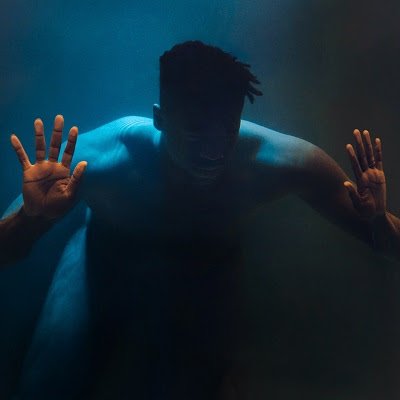There are some millennial artists who traverse the realms of soul, electronic and indie at the same time. Frank Ocean is one; Ireland’s James Vincent McMorrow is another. And we can add to that set Moses Sumney – the avant-garde Los Angeles singer/songwriter with the superlunary voice.
As it happens, all three are also both exploring modern masculinity and disrupting social codes from marginal positions. Ocean writes about sexuality as a queer black man in America – Blonde being his most indie foray. McMorrow referenced his teenage anorexia and bulimia on We Move – his most R&B album, inspired by Ocean. Sumney’s debut, Aromanticism, is a concept album about “lovelessness” in a society that conventionalises and commodifies romance.
Sumney discovered the term “aromanticism” in a late-night Dr Google sesh – the aromantic (or aro) being a person who doesn’t experience romantic attraction to others. He recently elaborated on the theme in a Tumblr post, citing Plato.
Aromanticism has its lamentations of loneliness. Sumney confronts his anxieties on the lead single, ‘Doomed’ – an existentialist operatic dirge. In the chorus, he sings, “Am I vital/If my heart is idle/Am I doomed?” But, in other songs, he revels about solitude. Alas, pop music has yielded few aromantic songs – The Human League’s ‘Life On Your Own’ was somewhat neglected in 1984 (weirdly, the New Wavers later released an LP entitled Romantic?). However, Aromanticism isn’t necessarily a declaratory album – Sumney is too nuanced for that.
Last summer, Sumney played in Australia for the first time. At Melbourne’s Sugar Mountain hipster fest, he staged a one-man gospelfolkelectro show, comprising his extraordinary vocals, looped and reverbed, plus guitar. Sumney offset his “sad songs” with witty stage banter. Come February, Sumney will return for Laneway 2018, alongside Anderson .Paak & The Free Nationals, The Internet and The War On Drugs. It will be fascinating to hear how Sumney performs Aromanticism since much of the material is concert hall-quiet. Indeed, it has the intimacy of Sampha’s Process and otherworldliness of Lana Del Rey.
You have to read Sumney’s interviews to glean biographical details. He was born in California to Ghanaian pastor parents, his childhood divided between the US and Ghana. During his school years, Sumney sang in a choir – and furtively penned his own songs. In 2014 he joined Karen O’s band as a guitarist. The same year, the bedroom musician premiered with his Mid-City Island EP. Last year he issued the refined Lamentations. An early fan, Solange sought his contribution to A Seat At The Table. For Aromanticism, Sumney signed to the US indie Jagjaguwar – aptly home to Bon Iver.
Aromanticism is Sumney’s most expansive work. He conducts a host of musicians – including Tosin Abasi from Washington DC prog metal band Animals As Leaders, Hundred Waters’ Nicole Miglis, and uber-bassist Thundercat. And, of course, Aromanticism is revealing.
Sumney opens with the choral acapella of ‘Man On The Moon (Reprise)’ – a throwback 2014’s ‘Man On The Moon’. Yet Aromanticism oscillates between minimalism and maximalism. The first full track, ‘Don’t Bother Calling’, is, again, the old folky Sumney – singing falsetto on guitar, with ghostly strings. He directly revisits numbers – Mid-City Island‘s ‘Plastic’ here a spare song that swells into something like classic Hollywood music. Solange’s influence is audible on ‘Make Out In My Car’ – alt-R&B with flute. ‘Quarrel’ has political overtones, Sumney alluding to inequitable power dynamics: “With you, half the battle/Is proving that we’re at war/I would give my life just for the privilege to ignore.” The album’s apex is the broken jazz ‘Lonely World’ – revisioned from Lamentations. Curiously, the least immediate song is ostensibly Sumney’s favourite – the acoustic ‘Indulge Me’, perhaps too reliant on its chorus.
Aromanticism is a career-defining album. Sumney in his own league as an auteur musician. And he may just have invented the aromantic genre.
–












